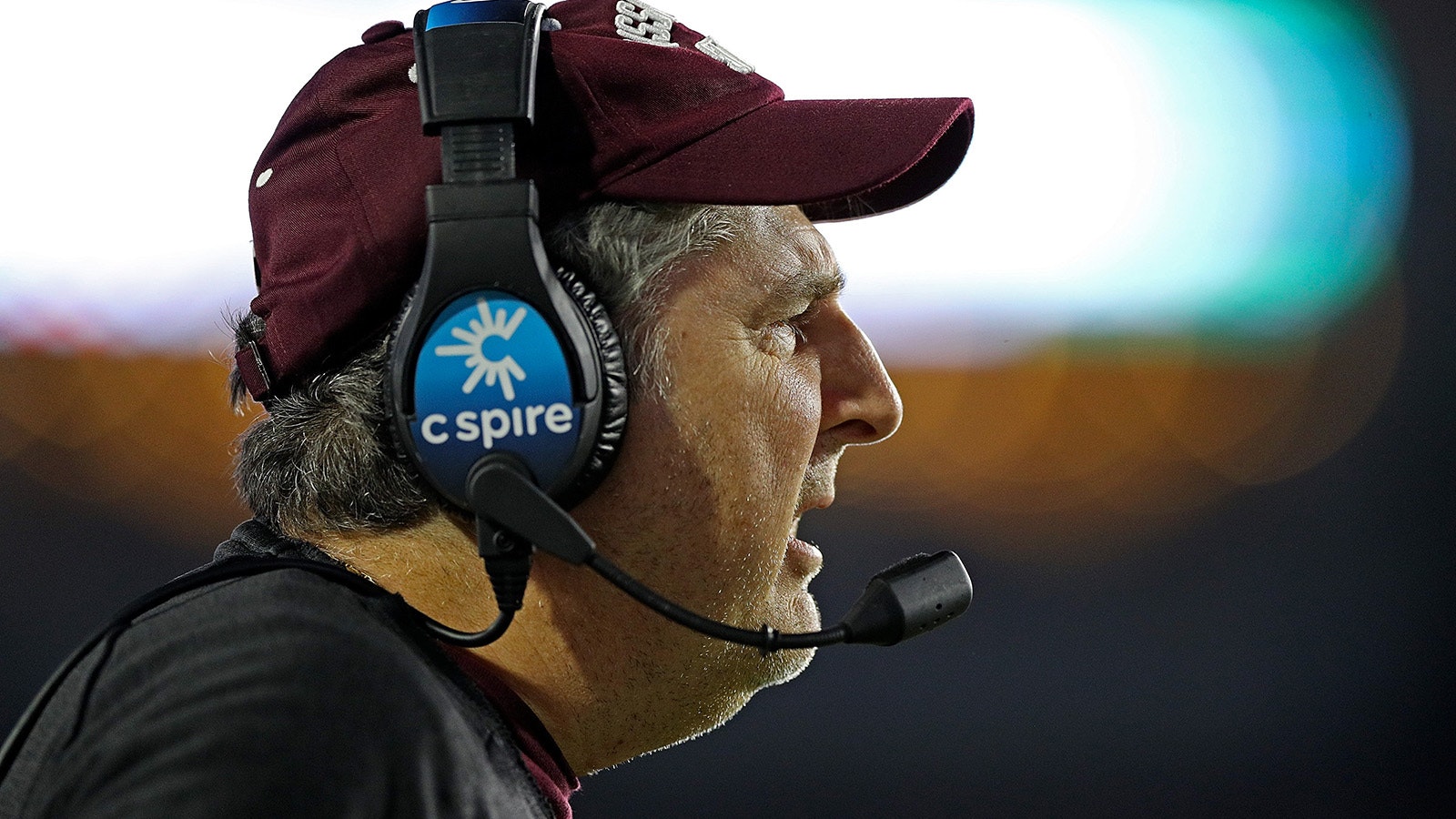Leo Wolfson, State Politics Reporter
Leo@Cowboystatedaily.com
Whenever Mike Leach made trips back to his hometown of Cody, Wyoming, football wasn’t usually the topic of discussion.
“We would just reminisce about the good old days,” said former high school teammate Rick Stonehouse.
Leach died unexpectedly Monday night after suffering complications from a heart issue. He was 61.
The head coach at Mississippi State University, Leach is considered by many to be one of the most influential college football coaches of his time.

News A Gut Punch
But for his former high school coach John McDougall, who coached football at Cody High School for more than 35 years, Leach was just one of the hundreds of former players he built a bond with that ran much deeper than football.
He had known Leach since he was a small child.
“You feel like someone got you in the gut, just punched right in the stomach,” McDougall said about learning Leach had died. “It just made you sick.”
Teammates
Leach was a member of the Cody High School football team, which served as the last stop of his playing career.
As a skinny sophomore, Leach lined up at defensive back on the 1976 state championship squad.
Stonehouse played with Leach on this team and the ’77 team.
“He didn’t do a lot,” Stonehouse said.
Stonehouse and McDougall said there was no indication that Leach would become anything more than an average high school football player. Then, he was better known for his track abilities.
“He spent his career proving that he was smarter than the rest of us,” Stonehouse said. “He became a real student of the sport.”
Leach’s coaching career is a testament that one doesn’t have to be an exceptional football player to be an exceptional coach, he said.

Student Of The Sport
After Cody, Leach went on to attend Brigham Young University. He had no direct involvement with the football team while he was there and played rugby.
But he was an avid fan of the Cougars and credited BYU coaching legend LaVell Edwards for helping inspire his pass-heavy “Air Raid” offense that went on to make him so successful as a coach.
“Very inquisitive, very detail-oriented,” Edwards said of his earliest interactions with Leach in a 2012 Salt Lake Tribune story. “You just knew he was going to move up through the ranks. Just an incredibly intelligent guy.”
He started coaching in the junior college ranks, where McDougall said Leach and his wife Sharon used the incentive of free tuition to work toward their master’s and doctorate degrees.
Moving Up The Ranks
Leach coached semi-pro football in Europe in the late 1980s.
McDougall said Leach only had to coach about three days a week with this job, spending the rest of the week traveling around the continent.
Through the 1990s, Leach elevated himself through the college football coaching ranks, rising to national prominence at the University of Kentucky, where he coached All-American Tim Couch.
After Kentucky, he went to Oklahoma and the Big 12, and then took a job at Texas Tech a year later.
“I told him, ‘If they’re dumb enough to believe you should be the man for the job, you’d be dumb enough to believe it,’” McDougall said with a laugh.
After 10 years at Texas Tech, Leach moved on to Washington State, where he oversaw some of the greatest success in that program’s history.
“He really thought outside the box,” said Cody football coach Matt McFadden, mentioning the impressive cadre of coaches who worked under Leach and are now running programs of their own.
They include Lincoln Riley at the University of Southern California.
“He really looked at things through a different lens,” McFadden said.
Just like 20 years prior, Leach conferred with McDougal before taking the job at Mississippi State as well.
“To go from being a skinny high school player in Wyoming to coaching in one of the top three conferences in college football is pretty impressive,” McDougall said.
Just ‘Another Guy’
Despite his professional achievements, Leach stayed the same guy through it all, Stonehouse and McDougal said.
When he made trips back to Cody, they both noted how little they talked about football when with him.
Leach gave McFadden a phone call to congratulate him after each of his recent four state high school championships. After a short initial call, the two built a camaraderie, with the last call lasting nearly 90 minutes.
“I laughed the whole time,” McFadden said.
McFadden said Leach regaled him with tales of mischief from his youth and his time playing under McDougall.
“He never big-timed you,” McFadden said. “You just felt like you were talking to another guy.”
Would Return Home
But that doesn’t mean the significance of the calls was lost on McFadden, who still has Leach’s first voicemail saved on his phone.
Leach would usually come back to Cody each summer and made a few appearances at class reunions. He and McDougall saw a few rodeos together over the years.
One recent summer Leach came back with ESPN in tow, shooting a feature on his upbringing in the cowboy town.
This year, he was an honorary marshal for the town’s Fourth of July parade. It would be the last time McDougall, Stonehouse or McFadden would see him in person.
“We’re really sad,” Stonehouse said.
Funny As Heck
Leach was as known for his off-the-cuff humor and eccentric personality as he was for his coaching ability.
Over the years, he made references to his players’ “fat little girlfriends” and his team proverbially getting their lunch money stolen after a disappointing loss.
He once made a Wyoming reference when asked about a talented young tight end at Washington State.
“He needs to be like those grizzly bears in Yellowstone Park that start tipping over dumpsters and throwing garbage out of them at the lodges,” Leach said in a 2012 Seattle Times story. “Next practice, we’re going to stick a dumpster in front of him.”
A Pirate At Heart
Leach also was known for his fascination with 18th-century pirates such as Blackbeard and Calico Jack. He lectured his players on the history of pirates and told them before games to “swing their swords.”
Leach authored a book with a similar title.
McDougall said Leach probably would’ve been a comedian if he hadn’t gone into coaching.
Stonehouse suspects Leach may have been considering a move back to Wyoming once his coaching career was over.
“He loved the area,” Stonehouse said. “I wouldn’t have been surprised if he came back.”





